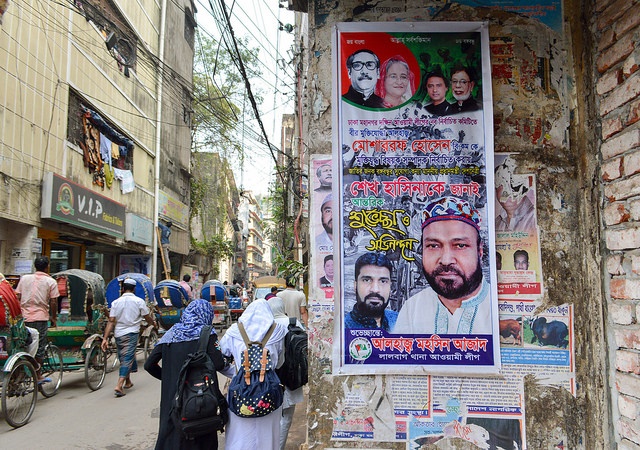Insight
Bangladesh Matters

New Research Highlights Questions as Well as Answers
With national elections around the corner, the need for new research could not be more urgent.
A spate of high profile terrorist attacks over the past two years briefly thrust Bangladesh to the forefront of discussions about the spread of violent extremism. After months of downplaying the threat, the government of Bangladesh responded to the attacks by expanding counter-terrorism operations. Successful terror attacks have declined significantly since the Holey Artisan Bakery attack, but it would be a grave mistake to assume a sense of complacency. Bangladesh remains at serious risk of future attacks and, despite the brief attention gained last year, we still lack an adequate understanding of the drivers of – and solutions to – violent extremism in the country. With the support of the RESOLVE Network and the United States Institute of Peace, a group of researchers are working to change that, and with general elections expected in early 2019, not a moment too soon.
In our September 2017 RESOLVE research report, Bangladesh on the Brink: Mapping the Evolving Social Geography of Political Violence, Matthew Nelson and I trace the historical context of the evolving threat of violent extremism in Bangladesh and explore existing literature on the subject. In many areas our research uncovered more questions than answers. Much of the conventional wisdom surrounding drivers of violent extremism, particularly the role of education and economics, fails to hold up. The Holey Bakery attackers, for example, were well-educated young men from middle class families. The attack was masterminded by a Canadian of Bangladeshi origin who was educated at the University of Windsor. Adequate data on the impact of other factors – including rapid urbanization, technological connectivity, and changing social mores – is lacking.
New research conducted for RESOLVE by Dr. C. Christine Fair and Dr. Wahid Abdallah provides new data that further erodes prior assumptions about links between socio-economic status, education, and support for terrorism. In a nationwide survey commissioned by RESOLVE, Drs. Fair and Abdallah found that: “Higher-income groups expressed greater support for militant groups, and better-educated Bangladeshis were more likely to support the ABT’s assassination of a well-known publisher than other demographics.”
Additionally, the study found greater support for violent extremist tactics among women, suggesting that more attention should be focused on women and their influence on attitudes toward violent extremism. Still, these findings are only beginning to scratch the surface.
Drs. Fair and Abdallah encountered an increasing no-response rate as survey questions became more sensitive. This phenomenon may coincide with findings in an additional study for RESOLVE authored by Drs. Ali Riaz and Syeda Salina Aziz. Using the same dataset as Drs. Fair and Abdallah, Drs. Riaz and Aziz found that “36 percent of the respondents stated that individuals have limited freedom in their expression of political views or their political activities.” Despite this hesitancy to discuss sensitive subjects, Drs. Riaz and Aziz uncovered some interesting – and important – insights into the complexity of political thought in Bangladesh. Whereas many in the West presume that democracy and Sharia are incompatible, Bangladeshis have a much more fluid idea of the two coexisting.
Bangladeshis overwhelmingly support democracy – 94 percent of respondents indicated a preference for democratically elected leadership. Within that majority support for democracy, however, are important divisions. While 55 percent prefer secular democratic leaders, 39 percent would prefer the country to be led by democratically elected religious leadership. The divide between “secular” and “religious” democrats may also involve complexities. Though 94 percent of respondents expressed support for democracy, 77 percent of respondents felt Sharia, or Islamic law, should play a larger role in the country’s legal system. Eighty percent of respondents believed that Sharia would ensure basic service provision, personal security, and justice as well as discourage corruption. The results of this study are clear: There is strong support within Bangladesh for both democracy and Sharia. How these seemingly competing ideologies are negotiated will be instrumental in shaping Bangladesh’s political landscape.
Unfortunately, it is unlikely that this negotiation will be entirely peaceful, and a fresh wave of violence may be imminent. Historically, political violence in Bangladesh has spiked around elections, and the country’s next national elections are expected in early 2019. The country’s main opposition party, the BNP, has already begun raising concerns about the neutrality of election overseers. Troublingly, in addition to clashes between supporters of the two main parties – the BNP and the Awami League – recent elections have also been the backdrop for vicious attacks against religious minorities by Jamaat-e-Islami.
In the coming elections, a volatile new element is expected to be added to the mix. Hefazat-e-Islam, the extremist group that released a 13-point agenda to radically Islamize Bangladesh in 2013, is reportedly planning to field candidates in 50 districts nationwide. Last year, Hefazat threatened to launch jihad in Bangladesh over a Supreme Court case on state religion and, in September, threatened to launch jihad against neighboring Myanmar in response to the persecution of Rohingya Muslims there. This raises the spectre of widespread violence should Hefazat and its supporters decide that elections are unfairly administered.
If recent research makes one thing clear, it’s that we still lack a clear picture of the complex social and political landscape in which violent extremism has spread in Bangladesh. For decision makers to craft effective policies to reduce the threat of violent extremism in Bangladesh, more research is needed. With national elections around the corner, the need for new research could not be more urgent.
Photo Credit: "Politics" by Francisco Anzola is licensed under CC BY 2.0.
For any further media inquiries please contact resolve@resolvenet.org